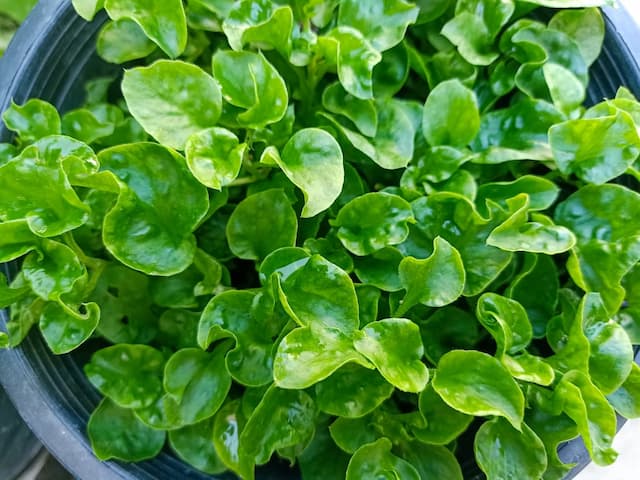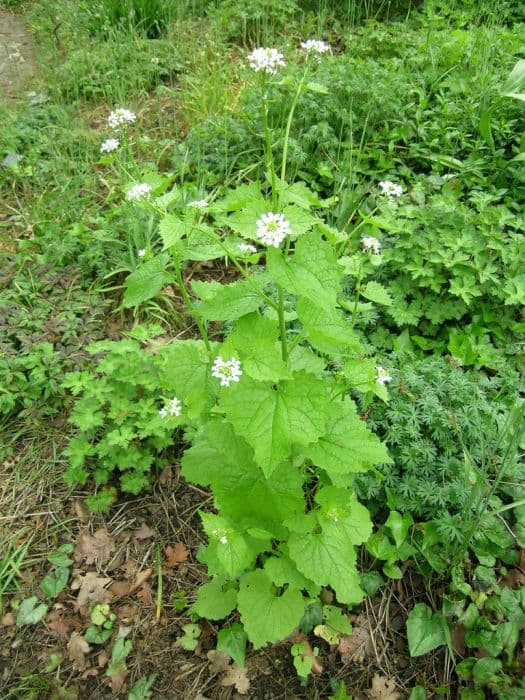Virginia Stock Malcolmia maritima

ABOUT
Malcolmia maritima, commonly referred to as Virginia stock, is a charming flowering plant with a bushy and compact form. This delightful floral specimen is characterized by its abundant small blooms that display a wide range of colors, including shades of pink, purple, lavender, and white, making it a kaleidoscope of hues. The flowers are typically comprised of four delicate petals arranged in a cross shape, which is a distinctive feature among plants in its family. The foliage of Virginia stock is equally appealing, composed of narrow, lance-shaped leaves. These leaves are a soft green hue and create a fine-textured backdrop for the vibrant blossoms. The combination of its floral abundance and attractive foliage makes Virginia stock an ornamental favorite in gardens, containers, and as a component in mixed borders, where its colors can be fully appreciated without the distraction of explicit size dimensions. Virginia stock is especially noted for its sweet and pleasant fragrance, which adds an additional sensory delight to its colorful display. This combination of visual and olfactory characteristics makes it a lovely choice for gardeners wishing to create an inviting and aromatic garden experience.
About this plant
 Names
NamesFamily
Brassicaceae
Synonyms
Virginia Stock, Virginia Malcolmia, Coastal Stock
Common names
Cheiranthus maritimus, Hesperis maritima, Malcolmia littorea, Malcolmia maritima var. brachycarpa, Malcolmia maritima var. littorea, Virginia maritima.
 Toxicity
ToxicityTo humans
Malcolmia maritima, commonly known as Virginia stock, is not typically listed as a toxic plant to humans. There is limited information about its toxicity, but it is generally considered non-toxic and does not commonly cause poisoning when touched or ingested. However, as with any plant, individual allergies or sensitivities can occur, so it is always best to exercise caution and avoid ingesting plants not verified as safe for human consumption.
To pets
Virginia stock, or Malcolmia maritima, is not widely known to be toxic to pets. There is no significant data indicating that pets would experience poisoning from ingesting this plant. However, pet owners should always be cautious and prevent pets from eating plants that are not certified as safe for their consumption, as individual animals may have different reactions, and not all potential toxins may have been documented.
 Characteristics
CharacteristicsLife cycle
Annuals
Foliage type
Deciduous
Color of leaves
Green
Flower color
Varies
Height
1 foot (30 cm)
Spread
1 foot (30 cm)
Plant type
Herb
Hardiness zones
7
Native area
Mediterranean
Benefits
 General Benefits
General Benefits- Easy to grow: Malcolmia maritima, commonly known as Virginia stock, is a hardy plant that requires minimal care and can thrive in a variety of soil types.
- Drought-tolerant: Once established, it has good tolerance to dry conditions and doesn't need frequent watering, making it suitable for water-wise gardens.
- Attracts pollinators: The flowers of Virginia stock are known to attract bees and butterflies, which are important for the pollination of crops and other plants.
- Ornamental value: With its beautiful and fragrant flowers, it is often used in gardens for decorative purposes, adding color and aesthetic appeal.
- Fast-growing: Virginia stock has a rapid growth rate, which allows gardeners to see the results of their work relatively quickly.
- Great for borders: Its compact size makes it an excellent choice for borders, rock gardens, and other areas where space may be limited.
- Seasonal variety: It blooms in spring and summer, providing seasonal variation and interest in the garden.
- Easy to propagate: Virginia stock can be easily propagated from seeds, allowing gardeners to produce more plants without the need for purchasing new ones.
 Medical Properties
Medical PropertiesThis plant is not used for medical purposes.
 Air-purifying Qualities
Air-purifying QualitiesThis plant is not specifically known for air purifying qualities.
 Other Uses
Other Uses- Virginia stock can be used as a natural dye source. The flowers and leaves can produce various shades when used to dye fabrics or yarns.
- It serves as an ideal plant for educational projects, such as teaching children about the lifecycle of plants due to its rapid growth and ease of care.
- Virginia stock is often planted to provide ground cover in garden beds, preventing soil erosion and suppressing weed growth.
- The plant can be used in container gardens, where its bright colors and fragrance can enhance the sensory appeal of small spaces like balconies and patios.
- Virginia stock seeds can be given as gifts encapsulated in seed paper, promoting eco-friendly practices and the spread of biodiversity.
- In floral art, the delicate blossoms of Virginia stock can be used for creating intricate and colorful pressed flower arrangements.
- Gardeners may use Virginia stock to attract pollinators such as butterflies and bees, thus supporting local ecosystems.
- The plant is sometimes incorporated in potpourri mixtures for a subtle fragrance, either in its dried form or with its essential oils extracted.
- Virginia stock can be used as a natural border in landscaping, creating visually pleasing lines and boundaries within a garden space.
- As a companion plant, Virginia stock can be interspersed with vegetables to provide a more diverse and aesthetically appealing garden layout.
Interesting Facts
 Feng Shui
Feng ShuiThe Virginia stock is not used in Feng Shui practice.
 Zodiac Sign Compitability
Zodiac Sign CompitabilityThe Virginia stock is not used in astrology practice.
 Plant Symbolism
Plant Symbolism- Innocence - Malcolmia maritima, commonly known as Virginia stock, is often associated with the purity and simplicity found in its delicate blossoms, representing innocent beauty.
- Cherishing Friendship - The sweet and light fragrance of the Virginia stock flowers symbolizes the appreciation of friendship and the joy brought about by companionship.
- Youthfulness - The plant’s tendency to grow quickly and bloom profusely in spring aligns with the idea of youth and vitality, symbolizing the exuberance of young life.
- Transient Life - As Virginia stock has a short lifespan, blooming for only a brief period, it can represent the fleeting nature of existence.
- Appreciation of Nature - With its natural coastal habitat and wildflower beauty, Virginia stock encourages a connection with the natural world and represents an appreciation for unspoiled landscapes.
 Water
WaterVirginia Stock should be watered thoroughly, allowing the soil to dry out between waterings. Depending on the climate and soil conditions, this usually means watering once or twice a week. It is important not to overwater, as Virginia Stock prefers drier conditions. When watering, aim to apply approximately 1 gallon of water per plant, ensuring that the water penetrates deeply to reach the root system, but avoid waterlogging the soil.
 Light
LightVirginia Stock thrives in full sunlight, so it should be planted in a spot where it will receive at least six hours of direct sun daily. The plant can tolerate partial shade, but flowering may be reduced in less than optimal light conditions. Choose a south-facing spot for maximum exposure to sunlight for best growth and flowering results.
 Temperature
TemperatureVirginia Stock flourishes in moderate to warm temperatures, ideally between 50°F and 75°F, which supports active growth and flowering. The plant can withstand temperatures as low as 20°F, and as high as 90°F, but prolonged exposure outside this range may stress the plant. The ideal climate is cool to warm with good air circulation.
 Pruning
PruningPruning Virginia Stock is done primarily to remove spent flowers, which encourages continued blooming throughout the season. Lightly prune after the first flush of flowers has faded to promote a second bloom. Pruning can be done every few weeks during the flowering season to keep the plant tidy and to stimulate new blooms. The best time for pruning is immediately after the first flowering wave.
 Cleaning
CleaningAs needed
 Soil
SoilVirginia stock thrives in well-draining sandy or loamy soil with a neutral to slightly alkaline pH, typically around 7.0-7.5. The best soil mix for Virginia stock would consist of two parts loam or garden soil, one part sand, and one part peat or compost to enrich the mix and ensure proper drainage.
 Repotting
RepottingVirginia stock, being an annual, does not generally require repotting as it will live its life cycle within a single season. Instead of repotting, plant new seeds each year in fresh soil to ensure robust growth.
 Humidity & Misting
Humidity & MistingVirginia stock prefers a dry to moderate humidity environment and does well in typical outdoor atmospheric conditions, making it unnecessary to alter humidity levels for this plant indoors.
 Suitable locations
Suitable locationsIndoor
Place Virginia stock in a sunny window with good air flow.
Outdoor
Plant Virginia stock in full sun, well-drained soil.
Hardiness zone
5-9 USDA
 Life cycle
Life cycleVirginia stock (Malcolmia maritima) begins its life cycle as a seed, usually sown directly into the ground in spring or autumn where it receives full sun or partial shade. After germination, which occurs depending on the temperature and moisture conditions, the seedling develops its first set of true leaves and begins the vegetative growth phase. During this stage, the plant establishes a robust root system and foliage. As it transitions into the flowering stage, Virginia stock produces clusters of fragrant flowers in shades of white, pink, or purple, typically blooming from late spring to early summer. After pollination, which is often aided by insects, the plant sets seed in small fruits called siliques which mature and eventually release seeds, completing the cycle. The plant is annual or biennial, meaning it completes its entire life cycle in one or two years, respectively, and then dies, relying on the new generation of seeds to continue the species.
 Propogation
PropogationPropogation time
Spring
Propogation: Virginia stock, known by its scientific name Malcolmia maritima, is primarily propagated through seeds. The best time for sowing these seeds is in early spring after the last frost has passed, or in late fall if the climate is suitable. The seeds should be sprinkled lightly onto the surface of well-drained soil and gently pressed into the earth, as they require light to germinate. Thinning may be necessary if seedlings emerge too densely. Seedlings develop rapidly and often bloom within weeks, making this method of propagation both efficient and rewarding for gardeners wishing to enjoy the delicate flowers of Virginia stock in their home landscape. Sowing seeds directly where they are to grow is favored because Virginia stock does not like to be transplanted due to its delicate root system.





![Wallflower [Winter Orchid]](/_next/image?url=https%3A%2F%2Fplants-admin.emdemapps.com%2Fimages%2Fplants%2F%2Fimages%2F604b62b20ab9a.png&w=640&q=75)



